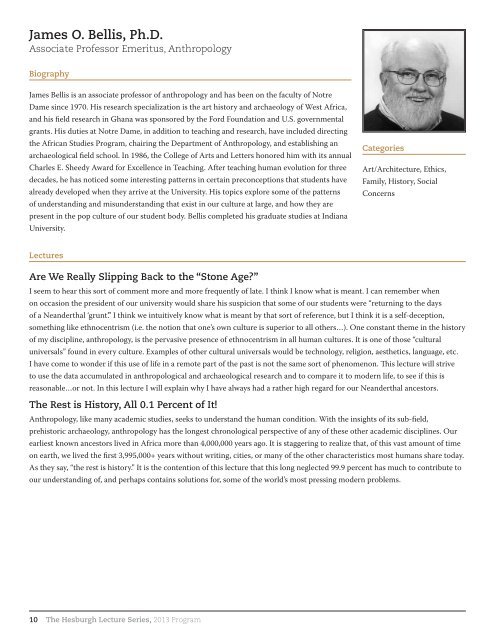HESBURGH LECTURE SERIES 2013 Program - Alumni Association ...
HESBURGH LECTURE SERIES 2013 Program - Alumni Association ...
HESBURGH LECTURE SERIES 2013 Program - Alumni Association ...
You also want an ePaper? Increase the reach of your titles
YUMPU automatically turns print PDFs into web optimized ePapers that Google loves.
James O. Bellis, Ph.D.<br />
Associate Professor Emeritus, Anthropology<br />
Biography<br />
James Bellis is an associate professor of anthropology and has been on the faculty of Notre<br />
Dame since 1970. His research specialization is the art history and archaeology of West Africa,<br />
and his field research in Ghana was sponsored by the Ford Foundation and U.S. governmental<br />
grants. His duties at Notre Dame, in addition to teaching and research, have included directing<br />
the African Studies <strong>Program</strong>, chairing the Department of Anthropology, and establishing an<br />
archaeological field school. In 1986, the College of Arts and Letters honored him with its annual<br />
Charles E. Sheedy Award for Excellence in Teaching. After teaching human evolution for three<br />
decades, he has noticed some interesting patterns in certain preconceptions that students have<br />
already developed when they arrive at the University. His topics explore some of the patterns<br />
of understanding and misunderstanding that exist in our culture at large, and how they are<br />
present in the pop culture of our student body. Bellis completed his graduate studies at Indiana<br />
University.<br />
Lectures<br />
Are We Really Slipping Back to the “Stone Age?”<br />
10 The Hesburgh Lecture Series, <strong>2013</strong> <strong>Program</strong><br />
Categories<br />
Art/Architecture, Ethics,<br />
Family, History, Social<br />
Concerns<br />
I seem to hear this sort of comment more and more frequently of late. I think I know what is meant. I can remember when<br />
on occasion the president of our university would share his suspicion that some of our students were “returning to the days<br />
of a Neanderthal ‘grunt’.” I think we intuitively know what is meant by that sort of reference, but I think it is a self-deception,<br />
something like ethnocentrism (i.e. the notion that one’s own culture is superior to all others…). One constant theme in the history<br />
of my discipline, anthropology, is the pervasive presence of ethnocentrism in all human cultures. It is one of those “cultural<br />
universals” found in every culture. Examples of other cultural universals would be technology, religion, aesthetics, language, etc.<br />
I have come to wonder if this use of life in a remote part of the past is not the same sort of phenomenon. This lecture will strive<br />
to use the data accumulated in anthropological and archaeological research and to compare it to modern life, to see if this is<br />
reasonable…or not. In this lecture I will explain why I have always had a rather high regard for our Neanderthal ancestors.<br />
The Rest is History, All 0.1 Percent of It!<br />
Anthropology, like many academic studies, seeks to understand the human condition. With the insights of its sub-field,<br />
prehistoric archaeology, anthropology has the longest chronological perspective of any of these other academic disciplines. Our<br />
earliest known ancestors lived in Africa more than 4,000,000 years ago. It is staggering to realize that, of this vast amount of time<br />
on earth, we lived the first 3,995,000+ years without writing, cities, or many of the other characteristics most humans share today.<br />
As they say, “the rest is history.” It is the contention of this lecture that this long neglected 99.9 percent has much to contribute to<br />
our understanding of, and perhaps contains solutions for, some of the world’s most pressing modern problems.



